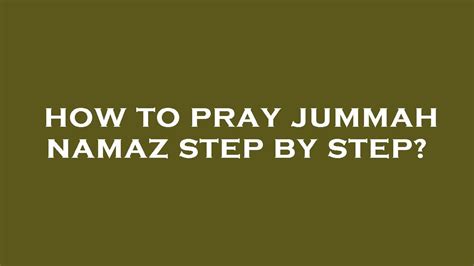Jummah Prayer: A Step-by-Step Guide for Beginners
Jummah prayer, the congregational Friday prayer in Islam, holds immense significance for Muslims worldwide. It's a cornerstone of the faith, offering a unique opportunity for communal worship, reflection, and connection with the divine. If you're new to Islam or simply unfamiliar with the specifics of Jummah, this comprehensive guide will walk you through the process step-by-step.
What is Jummah Prayer?
Jummah prayer replaces the Zuhr (noon) prayer on Fridays. It's a highly recommended, and for adult Muslim men, obligatory communal prayer performed in a mosque. The key difference from other daily prayers lies in its communal nature and the inclusion of a sermon (Khutbah) delivered by the Imam (prayer leader). This sermon focuses on Islamic teachings, current events, and reminders about piety and righteousness.
When and Where is Jummah Held?
Jummah prayer is held every Friday after the sun has passed its zenith (midday). The exact time varies slightly depending on location and the time of year. You can find the specific timings for your local mosque through their website or by contacting them directly. Jummah is performed in mosques, specifically designated spaces for congregational prayer.
What are the Requirements for Jummah Prayer?
- Purity: Before attending Jummah, it's essential to perform ritual cleansing (wudu). This involves washing specific parts of the body in a prescribed order.
- Cleanliness: Wearing clean and modest clothing is encouraged.
- Being in a State of Purity: The prayer requires a clean body and mind.
- Attending the Mosque: Jummah is a congregational prayer; it's performed in a mosque and not typically at home.
- Being a Muslim: While visitors are welcome to observe, the prayer itself is a ritual specifically for Muslims.
A Step-by-Step Guide to Performing Jummah:
-
Reaching the Mosque Early: Arriving early allows you to secure a good spot, find a place to perform Wudu if necessary, and settle in before the prayer begins.
-
Listening to the Khutbah (Sermon): The Imam will deliver two sermons (Khutbahs) with a short break in between. Active listening and reflection are crucial parts of the experience.
-
Following the Imam in Prayer: Once the Khutbah is completed, the Imam will lead the congregation in prayer. You'll follow his movements and recitations. (If you are unsure, observe other worshippers closely.)
-
Performing the Prayer: Jummah prayer consists of two rak'ahs (units of prayer), similar to Zuhr prayer but performed together and with specific variations under the Imam’s guidance.
-
Making Dua (Supplication): After the prayer, take time to make personal supplications to Allah (God).
What Happens During the Khutbah?
The Khutbah is a vital part of Jummah. It typically covers relevant Islamic topics, offering guidance, reminders, and interpretations of religious texts. The Imam might discuss contemporary issues, ethical dilemmas, or interpretations of the Quran and Sunnah (the Prophet Muhammad's teachings and practices). It's an opportunity for spiritual reflection and community engagement.
What if I Miss a Part of Jummah?
If you miss a significant part of the prayer or arrive late, it's best to offer the Zuhr prayer individually afterward.
Is Jummah Obligatory for Women?
While highly encouraged, Jummah prayer is not obligatory for women. They can perform Zuhr prayer at home.
What are the Benefits of Attending Jummah Prayer?
Attending Jummah provides numerous spiritual and social benefits:
- Enhanced Spiritual Connection: Shared worship strengthens one’s connection with Allah.
- Community Building: It fosters a sense of unity and brotherhood among Muslims.
- Learning and Growth: The Khutbah provides opportunities for religious learning and reflection.
- Collective Supplication: The congregational aspect magnifies the power of collective prayers.
This guide provides a basic overview of Jummah prayer. For a deeper understanding, consulting with knowledgeable individuals within your local Muslim community is recommended. The experience of Jummah is deeply personal and rewarding. May Allah accept your prayers.

